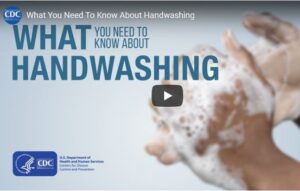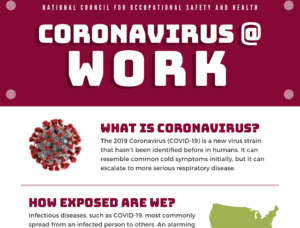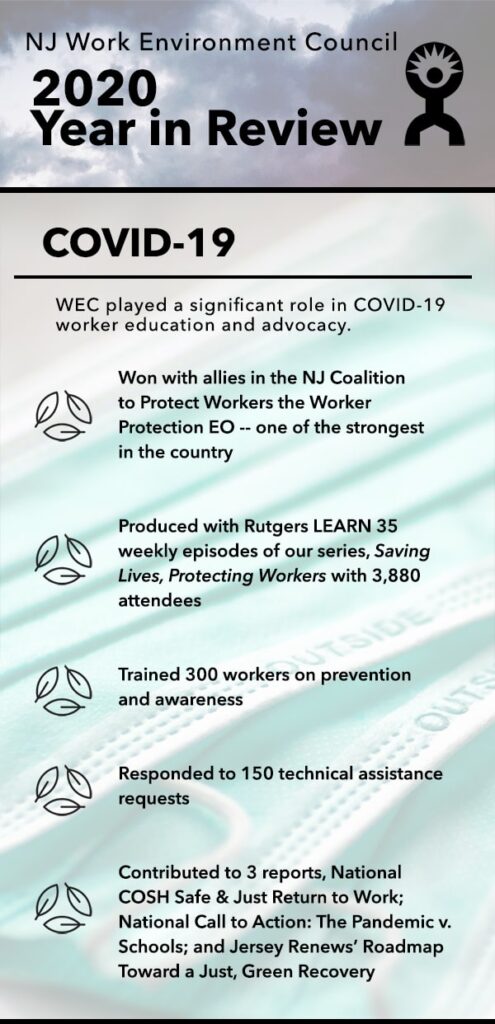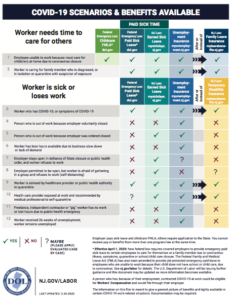COVID-19 Resources
What is COVID-19?
The most recent coronavirus, COVID-19, is a new strain of virus that hasn’t been identified before in humans. The COVID-19 virus is a respiratory pathogen that is highly contagious, and it is far more lethal than the flu virus.
Some symptoms of coronavirus include – fever, cough, body aches and tiredness and they can worsen and cause pneumonia, fluid in the lungs that leads to shortness of breath. The COVID-19 illness is more severe than the flu, and the chance of dying from it is greater than the seasonal flu, estimates up to 30x greater risk of death. COVID-19 has been able to spread from person to person very easily and requires an immediate response to protect workers and the general public.
The best way to prevent illness is to avoid being exposed to this virus. Some recent studies have suggested that COVID-19 may be spread by people who are not showing symptoms. The virus is thought to spread mainly from person-to-person, between people who are in close contact with one another (within about 6 feet), through respiratory droplets produced when an infected person coughs, sneezes or talks because these droplets can land in the mouths or noses of people who are nearby or possibly be inhaled into the lungs.
Protect Yourself!
Steps to Take to Protect Yourself
Below are some steps you can take to protect yourself at work or in your daily life. This is not a comprehensive list. It is important to note, as more is learned about COVID-19, the Center for Disease Control and Prevention (CDC) continues to update their guidance on how to protect yourself. For the most recent updates, visit the CDC website.
- Wear a mask to protect yourself and others and stop the spread of COVID-19. Wear your mask over your nose and mouth and secure it under your chin. Fit the mask snugly against the sides of your face, slipping the loops over your ears or tying the strings behind your head.
- Stay at least 6 feet (about 2 arm lengths) from others who don’t live with you.
- Avoid crowds. The more people you are in contact with, the more likely you are to be exposed to COVID-19.
- Avoid poorly ventilated spaces.
- Wash your hands often. If soap and water are not readily available, use a hand sanitizer that contains at least 60% alcohol.
- Monitor health daily.
- Get Vaccinated to Protect Against COVID-19
- Clean and disinfect objects and surfaces you touch often. Use cleaning products as directed.
Employers should follow the MOST protective guidance and standards issued by state or federal agencies. If guidance contradicts each other, the MOST protective should be implemented.
COVID-19 Weekly Updates: Saving Lives, Protecting Workers
In this weekly series, we will hear from and talk with public health experts, government officials, medical personnel, front-line workers and worker representatives about the latest developments in the fight against COVID-19. The series is sponsored by WEC, Rutgers Learn and Jersey Renews and airs on Tuesday @ 12pm. Want to receive weekly series emails, sign up here.
Past Webinar Summaries
February 23: COVID-19 Vaccines and the NJ Vaccine Distribution Program
Today we heard from two public health experts helping to guide the planning and execution of New Jersey’s COVID-19 vaccination program. Dr. Eddy Bresnitz, Medical Advisor to the NJ Department of Health and chair of the state’s Professional Advisory Committee, began by summarizing what New Jerseyans need to know about the two available FDA authorized vaccines (Pfizer and Moderna mRNA), including the following:
- Both vaccines are approximately 95% effective.
- Adolescents ages 16 and 17 are eligible to receive the Pfizer Biotech vaccine.
- It is not yet known how well the vaccine prevents COVID-19 transmission, so those vaccinated should still […]
Feb 9: An Agenda for Worker Safety and Health – COVID-19 and Beyond
This week, were were joined by Marcy Gelb, Co-Director, National COSH and Al Vega, Director Policy and Programs and Vice Chair of National COSH Board of Directors, who discussed the National Council for Occupational Safety and Health’s (National COSH) eight-point National Agenda for Worker Safety and Health, developed with more than 100 labor and community-based organizations.
Marcy outlined the devastating increase in mortality COVID-19 has brought to workers, and the enormous disparity in mortality between white and black and latino workers. She emphasized that COVID-19 is not just a workplace hazard, but a hazard for our entire community. It is critical that […]
February 2: Public Health, Worker Safety, and Transit Equity During Covid
This week we heard from two transit union representatives – Corey Gallman, Recording Secretary of Amalgamated Transit Union’s NJ State Council, and Jerome Johnson, General Chairman/President of Smart-TD Local 60, representing New Jersey bus and train workers respectively at NJ Transit. ATU and SMART joined us on the series last summer to discuss the impact of COVID-19 on their members. Today, both unions came back to share updates on PPE, cleaning and other safety measures, on-the-job violence that transit workers face.
We were also joined by Janna Chernetz, Tri-State Transportation Campaign’s Deputy Director and Director of New Jersey Policy. Janna shared statistics revealing the disparity in […]
January 26: Join Dr. Tina Tan, DOH Asst. Commissioner and State Epidemiologist as we discuss COVID-19
This week we were joined by Dr. Tina Tan, MD, MPH, State Epidemiologist and Assistant Commissioner of the Division of Epidemiology, Environmental and Occupational Health at the New Jersey Department of Health, where she oversees program areas in general communicable disease surveillance and control, immunizations, environmental and occupational health, and cancer epidemiology.
Dr. Tan traced the origin of the virus outbreak in the US and NJ, contextualizing the viruses history thus far and challenges in tracing and managing the outbreak for both the state and the nation. She covered our shift from a state of emergency, to the cancellation of mass […]
January 19: Impact of COVID-19 on NJ Long-Term Care
This week we covered the effect of COVID-19 on long-term care facilities, which have been ground zero for viral outbreaks. As the pandemic has ravaged senior communities across the country and frontline healthcare workers have faced PPE shortages, the federal government has offered weak and inconsistent aid to beleaguered nursing homes.
To discuss the ongoing impact of the pandemic on long-term care, we were joined by Matte Kane, Union Representative, UFCW 152, Kendra Bass, LPN, United Steelworkers Local 406 Recording Secretary, and Phillis Shivers, District 1199J, National Union of Hospital and Health Care Employees, AFSCME, AFL-CIO.
Our guests spoke to the unique workplace risks […]
The COVID-19 webinar series is sponsored by



Benefits for Workers
NJ Department of Labor and Workforce Development Resources
- What NJ Workers Need to Know about the Families First Coronavirus Response Act Factsheet
- NJ Division of Unemployment: https://myunemployment.nj.gov/
- Guidance for Self-Employed Individuals Filing a Pandemic Unemployment Assistance Claim and FAQs
- NJ Family leave Insurance: https://myleavebenefits.nj.gov/labor/myleavebenefits/worker/fli/index.shtml
- NJ Earned Paid Sick Leave: https://www.nj.gov/labor/worker-protections/earnedsick/law.shtml
- NJ Temporary Disability Insurance: https://myleavebenefits.nj.gov/labor/myleavebenefits/worker/tdi/index.shtml
Federal Paid Sick Leave and CARES act expansions and stimulus
- US Department of Labor: Families First Coronavirus Response Act: Employee Paid Leave Rights



